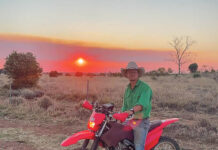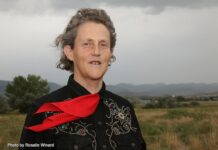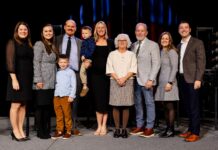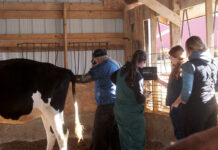ASHLAND, Ohio — When David White would take his son Andy to the county fair, like most farmers, David would stop to catch up with the other local farmers. While they talked — most likely on feed prices and the weather — little Andy would slip away unnonoticed. But David always knew right where to find his son: sitting in the front row of the livestock auction.
“I guess I must have been mesmerized by the auctioneers,” said Andy. Maybe it was the steady rhythm of the auctioneer’s chant that lured him in, but that early fascination would eventually lead him to win the World Livestock Auctioneer Championship in June this year. “It kind of came full circle,” he said.

Farming roots
Growing up on his family’s hog and row crop operation in Ashland County, White always had a passion for the agriculture industry. He initially pursued a degree in agriculture education at Ohio State University. However, White would not complete his degree, discovering the college route was not for him.
After coming back home and picking up a few odd jobs in construction and helping out another farmer, White came across an advertisement for the nine-day Missouri Auction School. “My attention span was able to take that,” said White.
Auction school
It was an intense nine days, explained White, but the auction school gives interested auctioneers a place to start. “They give you a basic chant and get you started in calling the numbers,” said White. The school gives its students “a taste” of different auction styles including livestock, automobile and real estate auctions. A majority of the class work is spent learning the rules and regulations needed to pass a test at the end of the course.
Young apprentice
Then, in order to obtain his Ohio auctioneer’s license, White had to serve a one-year apprenticeship. White served his apprenticeship with Steve Andrews, a well-known auctioneer with Andrews Auctioneers in Wooster, who, White says is “probably the main reason for my success.”
“He took on pretty well,” said Andrews, thinking back on his time mentoring White. “He always had a pretty strong passion for what he was doing, so that makes it easier.” Andrews said he can remember when the light bulb finally came on for White. “I turned him loose at a sale in Fredericktown,” he said. Andrews left the sale and when he came back, he thought to himself, ”Hmm, I think the boy has turned the corner.”

Competing
White would go on to win the Ohio Auctioneer Championship in 2007 and the International Auctioneer Championship in 2103. “When I won the international deal in 2013, I knew I wasn’t done competing, although most people said I was crazy if I kept going,” said White.
But White realized the contests sharpened his skills, and by subjecting himself to the criticisms, he could make himself better. “Because at the end of the day, it’s my producers, it’s my sellers, that benefit if I can be the best,” said White. This was White’s second year competing in the world championship — he took fourth overall last year.
The world contest
The World Livestock Auctioneer Championship (WLAC) is a three-part contest, explained White. Thirty semi-finalists are selected from three regional qualifiers to participate in the world competition in Lexington, Kentucky. An interview was held with each candidate to test knowledge of the livestock marketing business before each auctioneer showed off his skills during a live auction at the Paris, Kentucky, stockyards. “It is a real stockyard, with real cattle and a real buyers,” said White.
With hundreds of buyers in the audience, it’s the auctioneer’s job to find them and, “Most cattle buyers don’t bid blatantly,” said White. Part of the judges’ score is based on how well the auctioneer can spot the bidders. Other points are given based on presentation, voice quality and clarity, and rhythm and timing. After the first round, where participants sell eight drafts of cattle each, the judges select their top 10 to come back for the finals, selling 10 more drafts of cattle each.
“It’s all very fast, and they expect you to expedite sales,” said White. By the end of the day, a champion is named. White is only the second auctioneer from Ohio to win the world title. Ron Kreis, of Adamsville, won the championship in 2005.
Future contests
There are three main competitions in the auctioneering world: The International Auctioneer Championship, the WLAC, and the World Automobile Auctioneer Championship, explained White. Only one auctioneer has won all three, and the jury is still out whether White will give it a shot himself. Although, he added with a smile, “I would be foolish not to.”
Becoming a world champion auctioneer Q & A
Being named the World Livestock Auctioneer Champion is a title that Andy White does not take lightly. “To be honest, I still practice hours every day,” said White. Here is a closer look at how Andy got to where he is today.
Q. Where did you grow up?
A. I grew up on the home farm in Ashland. It was a hog and row crop farm with around 125 sows farrow to finish that has evolved into beef feedlot — a project with my dad and I — and we farm a couple hundred acres of corn, soybeans and a little bit of hay for the cattle.

The new feedlot will probably feed between 200-300 head a year. It’s just a family hobby that will someday be a good retirement project for my dad and hopefully it’s a good college fund for the boys if they want to get into it.
Q. Tell us about your family?
A. My wife, Megan, and I built our home next to the family farm a year ago and we have three boys: Ruger, 5, Danner, 3, and Case, 2.
Q. How long did it take you to get the hang of auctioneering?
A. It was almost two years into the business when I finally picked up on it. It’s just like anything else, you gotta put a lot of practice into it.
Q. How do you develop a chant?
A. It’s an ever-evolving process. In between the numbers, each auctioneer inserts his own unique filler words.
A lot of times, an auctioneer is more or less a melting pot of other auctioneers because you listen to other auctioneers. You try to figure out what their filler words are and try to implement them in your chant.
There have been a lot of days that I have just listened to tapes of Ron Kreis (an auctioneer from Muskingum County and the only other Ohioan to win the world championship). He is one that my chant has developed somewhat from.
Filler words have to fit who you are and fit your personality, but also fit your mouth. They have to roll of the tongue and keep the chant going. The numbers are most important but the fillers are the rhythm or the pleasing aspect of the chant.
Q. What are your filler words?
A. “Would you give?” “Better bid,” and “who’d bid.”
There are quite a few of them, but at this point they are just so subconscious.
Q. How do you keep from getting tongue tied?
A. They teach us tongue twisters (at the Missouri Auction School). It’s a way to loosen your mouth up and get your tongue ready for the day.

Q. How do you prepare for a sale?
A. It’s just like an athlete, you have to warm up before you start. Before an auction, you kind of have to stretch your jaw muscles out and warm up your vocal chords. I do a lot of humming to warm up my vocal chords.
When I stretch my jaw out, it’s usually when I am driving down the road going toward the auction, so most people would probably think I was crazy if they look at me.
A lot of the warmup has to do with how long you can sell throughout the day. You can go all day as long as the conditions are right, but you can strain your vocal chords if you go too long without warming up.
Q. What are some of your memorable moments?
A. I should have kept a diary because I have had some many neat things happen during sales.
My first in everything — the first time I sold an estate, household goods, antiques…I can still remember that very vividly. The first time I sold a farm. That might be the most memorable because of my agriculture background and knowing that I wanted to steer my business towards that.

But one of the other things that I think probably is the most meaningful is the county fairs because that’s where I got my start and that’s what paid for my education.
For me, to be a part of the county fairs and making sure these kids are rewarded for what they are doing, that really is the most rewarding aspect of my job.
Q. Who are your role models in the industry?
A. Steve Andrews: He’s the one that has got me started and in the right direction.
Joseph Mast: He was finishing his apprenticeship with Steve as I was starting. We got to know each other that way. Six years later, we ended up forming a partnership, Real Estate Showcase. He’s always been the one that has pushed me, and not so much knowingly, but just the fact that he’s so good.
Ron Kreis: His talent level is just beyond this world.
Q. You mentioned you enjoy working with youth. How do you work with youth who want to be auctioneers?
A. There are two different schools that I teach at from time to time — based on my schedule. The Ohio Auction School, in Columbus, and the Reppert School of Auctioneering, in Indiana.
With both these championships (world and international auctioneer championships), you become a role model in the industry. Just like me, most young auctioneers want to be livestock auctioneers and this (world championship) has kind of brought that to light.
I am happy to help them out, but the auction talent is something I can’t teach over the phone, it’s something you have to develop.
Q. Do you think people listen to tapes of you now?
A. I get people that say, “I drive down the road listening to tapes of you.” It’s a little weird, but that’s how people learn and there are a lot of auctioneers in the country that are 100 percent self taught by listening to those tapes.
It makes you realize that you can have an impact so it’s very important that you remain a good person, and if you have that impact at least you are teaching them something right.












I know Andys’s family and am glad I got this from you.
Thank you,
Betty Wiedle
Evergreen Grain Company